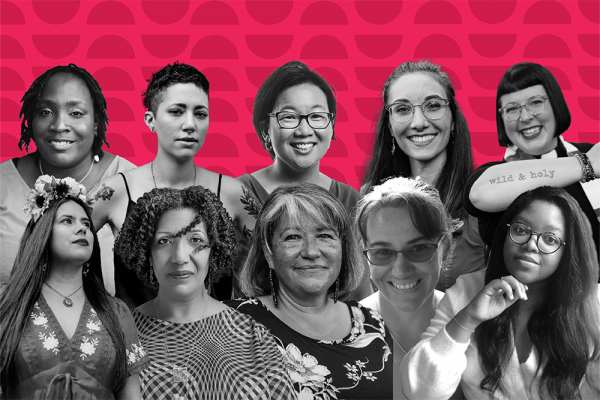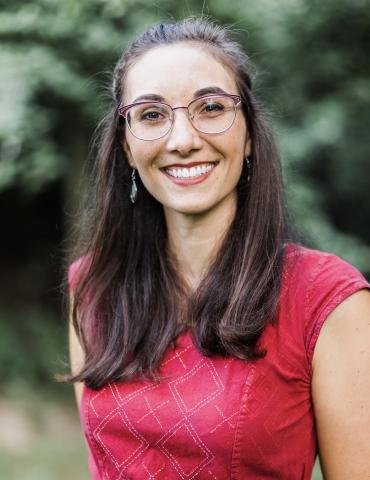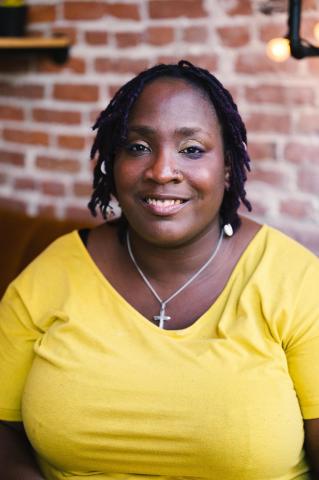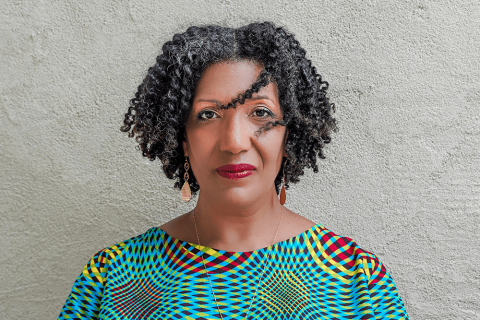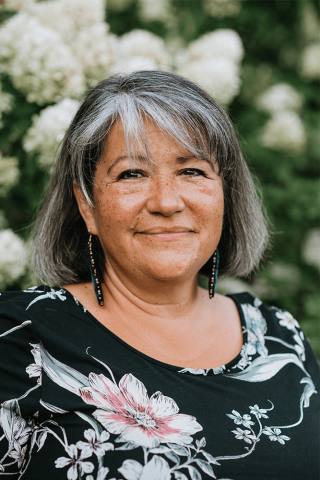For the past six years, Sojourners has celebrated Women’s History Month by sharing a list of Christian women who are bringing us hope and inspiring us to action. This year’s group includes pastors and poets, abolitionists and mothers, liturgists and storytellers; women who question authority, disrupt unjust systems, set boundaries, reimagine what’s possible, and pray. From advocating for prison abolition to restoring land to Indigenous people, these women are leading the way. Collectively, they are shaping the church into a more inclusive, bold, accessible, creative, and action-oriented community of believers who more fully honor the rhythms and identities within the family of God. We thank these leaders for their wisdom and praise God for their witness of radical justice.
We asked each leader to share why their work is so important, describe their vision of justice, and offer a prayer or blessings for 2022. We hope that you’ll grow and pray alongside these visionaries.
Emily Joy Allison
Emily Joy Allison is an author, poet, activist, and co-founder of the #ChurchToo hashtag, created to expose sexualized violence in Christian communities and build solidarity among survivors. Her book, #ChurchToo: How Purity Culture Upholds Abuse and How to Find Healing, was published with Broadleaf Books in March 2021. Emily holds a bachelor’s degree in theology from Moody Bible Institute and is currently pursuing a master’s degree in theological studies from Vanderbilt Divinity School with a concentration in religion, gender, and sexuality. She works in political communications and lives in Nashville, Tenn., with her wife Caitlin, their dogs, Harley and Oscar, and their cat, Debbie. Follow Allison on Twitter at @emilyjoypoetry.Why is the work you do so important right now?
In spite of most of us staying home from church for a year and a half, the work of #ChurchToo has not abated. More and more allegations continue to come out as people re-evaluate the place of church in their lives and the power and authority the institution holds. As the traditional authority of the church is questioned, those committed to it often lash out and double down, re-harming and retraumatizing survivors, so survivors need support and resources now more than ever. I see myself standing in a stream that was carved out for me by others before me, so it's not that my work is so important as much as the work is important, and I'm endeavoring to do it with all my might.
What is your vision for justice?
My vision for justice is one where survivors are centered and respectability is not a factor. So many of our “solutions” to injustice are limited because of our imagination — we cannot imagine better worlds, better systems than we have now, so we think our only option is to work within them. My vision for justice is one where the systems are blown wide open and new worlds can be built.
Melissa Florer-Bixler
Melissa Florer-Bixler is the pastor of Raleigh Mennonite Church in Raleigh, N.C. She is the author of two books and has bylines in multiple magazines and journals. She is sustained by abolition communities who creatively work to free our imaginations from carceral logic. That work has led her into co-conspiring for the freedom (of all kinds) for the women of the North Carolina Correctional Institute for Women, and toward building communities that welcome, celebrate, and help to heal people who are subjected to incarceration. You can stay in touch with Florer-Bixler on Twitter at @MelissaFloBix.
What is your vision for justice?
I want to be part of communities that cultivate a kind of justice that directs internal healing, restoration, and liberation outward. There's a saying that “abolition begins at home.” If we can’t sustain relationships and movements that provide actions and spaces for return when we hurt and harm others, how can we expect that vision to move beyond us? If we can’t find alternatives to punishment and coercion among us, we’re repeating carceral logic. Justice means liberation from oppression but also from the tools of violence that build our oppressive systems.
A prayer for 2022:
God, who refuses to be God without us, enlighten our imaginations for a world coming into being again. The world is always becoming, turning and opening, but we are creatures of habit. We bow to idols of false safety and prostrate before prisons. But you are the God of crumbling walls, the God who shakes open jail gates. Gather us into the promise of your restoring hope and make us well.
Rev. Letiah Fraser
Rev. Letiah Fraser is a New York City native living in Kansas City, Mo. She is an ordained pastor with the Church of the Nazarene, an activist and organizer connected with the Kansas Poor People’s Campaign, a disability rights advocate, a hospital chaplain, and a doctoral student. She is one of many contributors to the book, We Cry Justice: Reading the Bible with the Poor People’s Campaign. Fraser is also part of PC(USA)’s New Worshiping Communities. For two years, she has been serving as a resident at The Open Table KC in Kansas City, Mo. She has launched The Ubuntu Community in September. She is passionate about the intersections of faith, race, and disability. She identifies as a proud African American, practicing Christian woman who lives with a physical disability. You can stay in touch with Fraser on Twitter at @RevLetiah.
Why is the work you do so important right now?
My work can be summed up in two words: prophetic and compassionate. In whichever role I find myself on any given day, my passion and purpose is to curate space in which truth about the realities of life — especially those who live with intersectionalities — can be told in verbal or written form and held with care, a care that moves into action. This work is important because it amplifies voices that struggle to be heard: those who live with disabilities, BIPOC folx and women, especially Black women. I hope to expand on my vision to create such space when my doctoral program is completed in April.
What is your vision for justice?
My vision for justice is doing whatever I can and partnering with whomever I can to work toward a complete restructuring of society. A society that recognizes all people as human. A society that is pro-Black, pro-women, and pro-people with disabilities. A society in which meaningful dialogue is possible, even with those whom we disagree. I want to exist in a world in which I don’t want to escape my body because being a Black female with a disability is triple stigmatized. I want to live in a world where all feel at home in their bodies and in the world.
Lisa Sharon Harper
Lisa Sharon Harper is the founder and president of Freedom Road, a consulting group that crafts experiences that bring common understanding and common commitments that lead to common action toward a more just world. Lisa is a public theologian whose writing, speaking, activism, and training has sparked and fed the fires of re-formation in the church from Ferguson, Mo., and Charlottesville, Va., to South Africa, Brazil, Australia, and Ireland. Lisa’s book The Very Good Gospel was named 2016 “Book of the Year,” and the Huffington Post identified Lisa as one of 50 Women Religious leaders to Celebrate on International Women’s Day in 2015. Her latest book, Fortune: How Race Broke My Family And The World—And How to Repair It All, is now available. Follow Harper on Twitter at @lisasharper.
What is your vision for justice?
The motivating vision of my life is the vision of the Beloved Community. I am convinced the goal of God is not that humanity becomes perfect. Rather, that humanity becomes reconnected with God, with self, with the other, within families, with the rest of creation and systems that govern us and between nations. In this vision we are reconnected in an inextricable web of radically loving relationships.
A blessing for 2022:
This new year feels different. Doesn’t it? It feels like the inhalation before a long deep breath. May you fill your body, your mind, and your soul with breath in this transition space. May you reach deep, connect again to your body, to your soul, to your heart, to your giggle. May this connection overcome the hopelessness and helplessness streaming from cable news and click bait. May your deep reach reconnect you to your own core. And may you rediscover your own power. Yes. YOUR power. May reconnection to self lead you to rediscover the image of God within you. And may the image of God remind you of the reality of God. May reconnection to the reality of God fill you with hope for 2022. For the reality of God assures us that when we come to the end of our own power, there God is — moving mountains. May you witness mountains moving in 2022. Know this. It starts with reconnection to you.
Rev. Jes Kast
jes_kast_edited.png
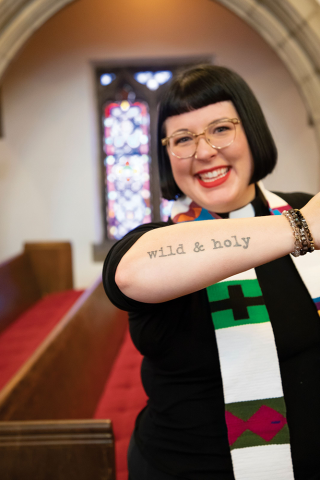
Rev. Jes Kast is pastor to the warm hearts and thoughtful people of Faith UCC, which is her second congregation as an ordained Minister of Word and Sacrament in the United Church of Christ. In January 2021, she was on the cover of Spirituality & Health Magazine, which named her one of the “spiritual radicals” helping “define the future of spirituality.” She and her wife live in Central Pennsylvania where she loves learning from the local farmers and visiting unique vintage stores. You can stay in touch with Kast on Twitter and Instagram.
Why is the work you do so important right now?
Less than 15 percent of senior or lead-level pulpits in the United States are led by women, and there are even fewer opportunities for queer women to serve at a senior level. I am one example of a few, and hopefully many more after me, who will lead and serve local churches because we love God, we love our neighbor, and we really believe the life-changing message of Jesus. The local church is where we not only spiritually nourish our souls but also do justice, love mercy, and live humbly. Our liturgies change the landscape of our lives; worship creates a new world.
A prayer for 2022:
Place your hand on your heart and offer this prayer as you feel holy breath moving through your blessed body: “God of the ground and God of grace, restore the joy of being alive in my soul. Let laughter be a familiar language to me this year. Help me to be gentle with myself and with others. Embolden my courage so that justice, mercy, and humility would be my heartbeat. In the most liberating and beautiful love of Jesus, amen.”
Patty Krawec
Patty Krawec is an Anishinaabe/Ukrainian writer and speaker from Lac Seul First Nation. She is a current board member of the Fort Erie Native Friendship Center. She is the cohost of the Medicine for the Resistance podcast and cofounder of the Nii’kinaaganaa Foundation, which collects funds and disperses them to Indigenous people and organizations. Her work has been published in Sojourners, Rampant Magazine, and Midnight Sun. She also posts podcasts and essays about books on Substack. Her book, Becoming Kin: An Indigenous Call to Unforgetting the Past and Reimagining Our Future, will be published in September by Broadleaf Books and is now available for pre-order. Krawec attends Chippawa Presbyterian Church and lives in Niagara Falls, Ontario. Find her on Twitter @gindaanis.
What is your vision for justice?
What is now is not what must be, and for me, the only way forward is in the restoration of land to Indigenous people. Unless our faith and social movements reckon with the fact of stolen land, they can be equitable and inclusive, but they will still perpetuate settler colonialism and cause harm to Indigenous peoples.
A blessing prayer for 2022:
To the land of the Ojibwe-Anishinaabe that holds memory of me. To the waters that carried that knowledge to the place I live now. Land and water that remember treaties and agreements made between humans and greater-than-human relatives. Stars and other beings that bore witness to these agreements. I acknowledge and thank you for taking our follies and our gratitudes and still providing, still keeping your promises even while we don’t keep ours. To the Creator who made all of these things. I say miigwech. Chi-miigwech. You are eternity in my hands, above my head, and beneath my feet.
Rev. Aurelia Dávila Pratt
aurelia_pratt.jpg
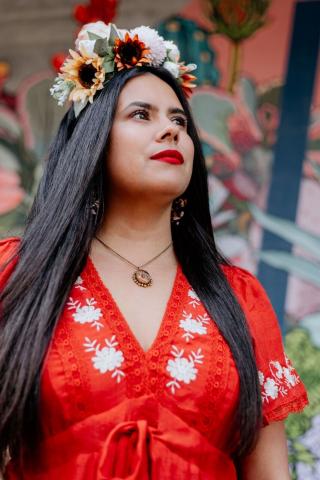
Rev. Aurelia Dávila Pratt is the lead pastor of Peace of Christ Church in Round Rock, Texas, and co-host of the Nuance Tea Podcast. Her upcoming book, A Brown Girl’s Epiphany: Reclaim Your Intuition & Step into Your Power, is available for pre-order. Follow her on Instagram at @revaureliajoy, where she is reimagining faith and theology via spoken and written word.
Why is the work you do so important right now?
Bad theology is responsible for so many of our societal harms, such as the hierarchical systems of patriarchy and white supremacy. People need safe spaces to wake up to these realities, to find healing from them, and to shift into liberative paradigms concerned with our collective wellness. Whether it’s in my local church context, through my writing, or online, I am compelled (with great urgency!) to create such spaces for those in need of it.
What is your vision for justice?
Endless social media accounts spout toxic positivity and wellness paradigms that never extend outward, while countless justice workers are burnt out from self-neglect. Sustainable justice work is grounded in a both/and understanding of imago dei. When we fully acknowledge the image of God within ourselves, we can no longer neglect the imago dei of the other. Our own healing and thriving supports our continued justice work, and neither should be neglected.
Cole Arthur Riley
Cole Arthur Riley is the author of This Here Flesh: Spirituality, Liberation, and the Stories that Make Us. She is also the creator of Black Liturgies — a space for Black spiritual words of liberation, lament, rage, and rest — and a project of The Center for Dignity and Contemplation. She currently serves as spiritual teacher in residence with Cornell University’s Office of Spirituality & Meaning Making. You can stay in touch with Riley on Twitter and Instagram.Why is the work you do so important right now?
The first time I read James Baldwin felt like I was coming home to myself. I felt like I had at last found permission to work toward justice and renewal in a way that aligned with my story and sense of self. He was a writer, and he knew his pursuit of Black liberation must operate out of that. It was really important that I find a path that allowed for the writer in me to awaken again. I want more of us to operate out of our truest selfhood, out of an acquaintance with our own interior worlds. And I want more of us to locate a spirituality that includes the voice of the artist. James Baldwin said, “only artists can be trusted to tell the truth.” It feels arrogant to imply that this is always me. But I hope at least on occasion, it is.
A prayer for 2022:
God of the flesh, would you remind us that our bodies are good. Restore in us a connection to the self that includes the physical. We have known what it is to have our bodily agency stolen from us. We have known what it is to have our bodies used more than loved. As we long for justice and liberation, train us toward reclamation, that we would listen to and befriend our bodies. That we would make, eat, drink, rest, weep, stretch, move in freedom, knowing our flesh is sacred and worthy of sacred attention.
Nikki Toyama-Szeto
nikki_toyama-szeto.jpg
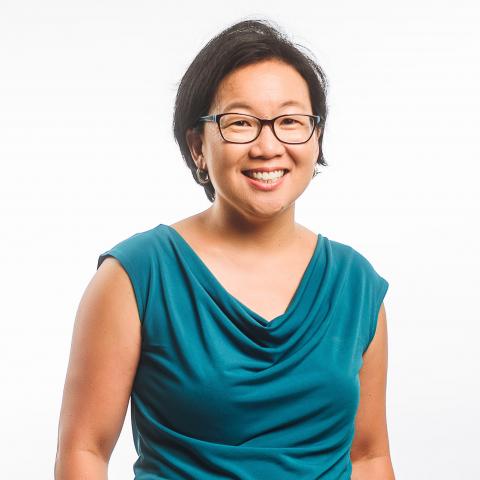
Why is the work you do so important right now?
The pandemic and the racial reckoning of the past few years have made it clear that the United States has unfinished business. I’m excited to see how people within the church are reflecting critically on the ways that the church, its history, and structures have contributed to the injustices that we see. At the same time, Christians bring essential tools around racial healing, generational sin, and a vision for what it looks like for all people to flourish that I think is helpful and adds color and texture to solutions that only look at the here and now. There is an opportunity to take a look at history, lament, and grieve, because we can also be a part of establishing foundations for new futures.
What is your vision for justice?
Justice is the dream that God dreams for God’s people — for all of creation to have life and have it to the full. Where oppression, greed, racism have suppressed the image of God — justice is essential prerequisite. Justice is also an invitation to participate in God’s work of renewing the world. It is to recognize the powerful gifts God imparted to all people, and to make generous space for everyone to come and offer those gifts unhindered for the goodness of the global church.
Lydia Wylie-Kellermann
Lydia Wylie-Kellermann lives with her partner and two boys on the street where she grew up in southwest Detroit. She is the editor of Geez magazine, which sits at the intersection of art, activism, and spirit. She is the editor of The Sandbox Revolution: Raising Kids for a Just World. You can stay in touch with Lydia on Twitter at @lydiaiwk.
Why is the work you do so important right now?
My work is a woven tapestry of children and gardens, stories and questions, movement and local economy, and words poured on paper as an act of prayer. Each strand asks Grace Lee Boggs’ question, “What time is it on the clock of the world?” How do we stand honestly in the face of what is real and what is coming: white supremacy, disaster capitalism, climate catastrophe, and on and on. And how do we let part of the work and resistance be to fall in love with all that we encounter?
A blessing for 2022:
I yearn, I ache, I pray
that the days are coming
when our bodies
can be with other bodies.
When we can breathe all over one another
without the fear of harm.
I want to grab hands,
break bread,
share of the same cup,
and find that spontaneous harmony.
I long for the courage and imagination
that breathes when folks are gathered at table.
Whether these days are upon us or not quite yet,
lay down on the soft earth and feel the sunlight on your skin.
Keep watch for snowbells and baby robins.
Feel life stirring deep in your belly.
Tend to that seed.
And know that you are not alone.
Rejoice in the great conspiracy that has begun.
Got something to say about what you're reading? We value your feedback!
